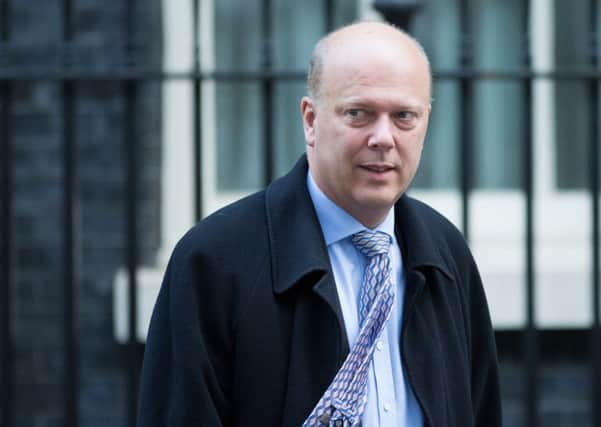No review of ‘joint enterprise’ prosecutions before election, says Grayling


MPs on the Justice Select Committee last year called for an “urgent review” of the law in murder cases, saying it has growing concerns the common law doctrine may be causing injustice.
But in his response, published today, Justice Secretary Chris Grayling said “it would not be appropriate” to ask the Law Commission to launch a review prior to the election in May, as “this would effectively tie incoming Ministers to a particular course of action”.
Advertisement
Hide AdAdvertisement
Hide AdHe added: “The scope of any review and who should lead it are issues that should rightly be left to new Ministers.”
Demonstrations will tomorrow be held in Leeds, Liverpool and London, including one involving the families of three men convicted of murdering a Bradford father-of-three last year, in a bid to “abolish or seriously amend the joint enterprise doctrine”.
Joint enterprise allows the prosecution of members of a group or gang for murder when it cannot be proved which member of the group inflicted the fatal blow.
Defendants can be convicted if a jury finds they had foresight that another member of the group “might” kill or inflict serious harm.
Advertisement
Hide AdAdvertisement
Hide AdSuccessful prosecutions brought under the law include that of the killers of Stephen Lawrence in 2011, more than 18 years after the black teenager was stabbed to death in south-east London.
But the doctrine is controversial because many believe it allows those who are too remote from the crime to be prosecuted.
Mr Grayling said in his response: “I recognise that families of convicted offenders and academics believe that the ‘foresight’ principle is too harsh, particularly where the conviction is for murder and a mandatory life sentence is imposed.
“However, there are many law-abiding citizens and families of victims who disagree and who may be concerned if the changes suggested by academics meant that certain offenders could no longer be prosecuted for murder.”
Advertisement
Hide AdAdvertisement
Hide AdJustice Committee Chairman Sir Alan Beith told The Yorkshire Post yesterday: “I am glad the Government has taken seriously the impact of joint enterprise, particularly in murder cases where there is a mandatory life sentence, but they are clearly unwilling to take the matter forward in this Parliament, or to come to a firm view on the need for some change in the way the doctrine operates.
“The risk therefore remains that there may be individuals who remain in prison for many years with a sentence that critics would say was inappropriate for their very limited involvement, and that courts will be obliged to pass mandatory life sentences in future similar cases”.
At tomorrow’s demonstration in Leeds, organised by the campaigners Joint Enterprise Not Guilty by Association (JENGbA), the families of Andrew Feather, Joseph Lowther and Robert Woodhead will be gathering signatures for the group’s petition.
The three men, along with another man, Lee Calvert, were last year convicted and jailed for the acid attack murder of Bradford father-of-three Barry Selby in a trial where the joint enterprise doctrine was used.
Advertisement
Hide AdAdvertisement
Hide AdAll denied murder and after having an initial appeal rejected by a judge, they are set for an oral hearing in front of three Court of Appeal judges later this year.
JeNGbA campaigner Jan Cunliffe, from Wigan, said Chris Grayling’s refusal to launch a review was “the result I expected”.
She said: “Every time the Justice Select Committee comes up with recommendations the Government finds an excuse not to act because they don’t want to take any responsibility for it.
“It is disappointing but it is expected. It makes it more important to make this an election issue. If we get a new Government, whoever that is, this will be a hot topic.
“In a way they have admitted it is a problem by saying it should be dealt with by new ministers ‘but not us’. They are saying it is too complicated and expensive to be dealt with at the moment.”